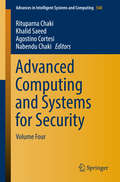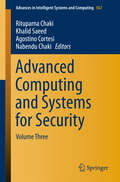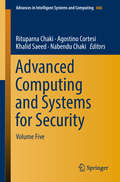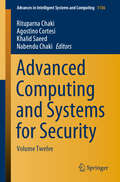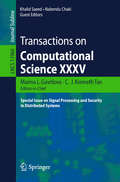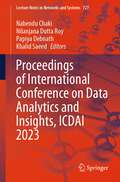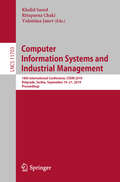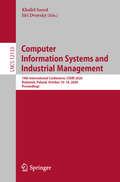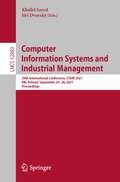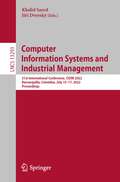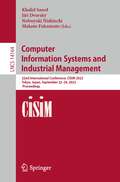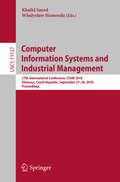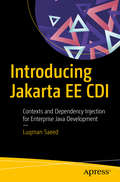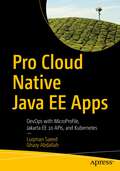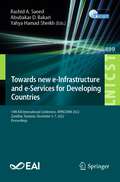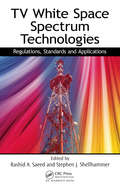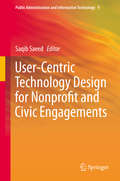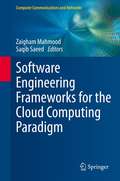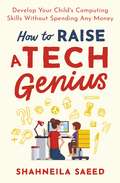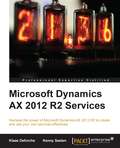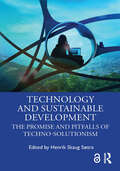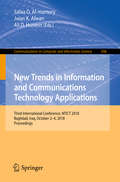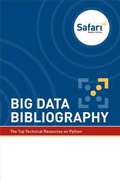- Table View
- List View
Advanced Computing and Systems for Security: Volume Four (Advances in Intelligent Systems and Computing #568)
by Khalid Saeed Nabendu Chaki Agostino Cortesi Rituparna ChakiThe book contains the extended version of the works that have been presented and discussed in the Second International Doctoral Symposium on Applied Computation and Security Systems (ACSS 2015) held during May 23-25, 2015 in Kolkata, India. The symposium has been jointly organized by the AGH University of Science & Technology, Cracow, Poland; Ca' Foscari University, Venice, Italy and University of Calcutta, India. The book is divided into volumes and presents dissertation works in the areas of Image Processing, Biometrics-based Authentication, Soft Computing, Data Mining, Next Generation Networking and Network Security, Remote Healthcare, Communications, Embedded Systems, Software Engineering and Service Engineering.
Advanced Computing and Systems for Security: Volume Three (Advances in Intelligent Systems and Computing #567)
by Khalid Saeed Nabendu Chaki Agostino Cortesi Rituparna ChakiThe book contains the extended version of the works that have been presented and discussed in the Second International Doctoral Symposium on Applied Computation and Security Systems (ACSS 2015) held during May 23-25, 2015 in Kolkata, India. The symposium has been jointly organized by the AGH University of Science & Technology, Cracow, Poland; Ca' Foscari University, Venice, Italy and University of Calcutta, India. The book is divided into volumes and presents dissertation works in the areas of Image Processing, Biometrics-based Authentication, Soft Computing, Data Mining, Next Generation Networking and Network Security, Remote Healthcare, Communications, Embedded Systems, Software Engineering and Service Engineering.
Advanced Computing and Systems for Security: Volume 5 (Advances In Intelligent Systems And Computing #666)
by Khalid Saeed Nabendu Chaki Agostino Cortesi Rituparna ChakiDiscusses recent research trends in the areas of computational intelligence, communications, data mining, and computational models.<P><P> Presents applications to design, analysis, and modeling for key areas in computational intelligence.<P> Discusses efficient computational algorithms and robust tools for efficient implementation.<P> This book contains extended version of selected works that have been discussed and presented in the fourth International Doctoral Symposium on Applied Computation and Security Systems (ACSS 2017) held in Patna, India during March 17-19, 2017. The symposium was organized by the Departments of Computer Science & Engineering and A. K. Choudhury School of Information Technology, both from University of Calcutta in collaboration with NIT, Patna. The International partners for ACSS 2016 had been Ca Foscari University of Venice, Italy and Bialystok University of Technology, Poland.<P> This bi-volume book has a total of 21 papers divided in 7 chapters. The chapters reflect the sessions in which the works have been discussed during the symposium. The different chapters in the book include works on biometrics, image processing, pattern recognition, algorithms, cloud computing, wireless sensor networks and security systems.
Advanced Computing and Systems for Security: Volume Twelve (Advances in Intelligent Systems and Computing #1136)
by Khalid Saeed Nabendu Chaki Agostino Cortesi Rituparna ChakiThis book features extended versions of selected papers that were presented and discussed at the 7th International Doctoral Symposium on Applied Computation and Security Systems (ACSS 2020), held in Kolkata, India, on February 28–29, 2020. Organized by the Departments of Computer Science & Engineering and A. K. Choudhury School of Information Technology at the University of Calcutta, the symposium’s international partners were Ca' Foscari University of Venice, Italy, and Bialystok University of Technology, Poland. The topics covered include biometrics, image processing, pattern recognition, algorithms, cloud computing, wireless sensor networks, and security systems, reflecting the various symposium sessions.
Transactions on Computational Science XXXV: Special Issue on Signal Processing and Security in Distributed Systems (Lecture Notes in Computer Science #11960)
by Khalid Saeed Nabendu Chaki Marina L. Gavrilova C. J. Kenneth TanThe LNCS journal Transactions on Computational Science reflects recent developments in the field of Computational Science, conceiving the field not as a mere ancillary science but rather as an innovative approach supporting many other scientific disciplines. The journal focuses on original high-quality research in the realm of computational science in parallel and distributed environments, encompassing the facilitating theoretical foundations and the applications of large-scale computations and massive data processing. It addresses researchers and practitioners in areas ranging from aerospace to biochemistry, from electronics to geosciences, from mathematics to software architecture, presenting verifiable computational methods, findings, and solutions, and enabling industrial users to apply techniques of leading-edge, large-scale, high performance computational methods. This, the 35th issue of the Transactions on Computational Science, focusses on signal processing and security in distributed systems. The topics covered include classification of visual attention levels using microsaccades; analysis of textual content using Eyegaze; automatic car-accident detection and passenger counting; face recognition; secure data fusion in IoT; business compliance using goal models; and microfluidic executions.
Proceedings of International Conference on Data Analytics and Insights, ICDAI 2023 (Lecture Notes in Networks and Systems #727)
by Khalid Saeed Nabendu Chaki Nilanjana Dutta Roy Papiya DebnathThe book is a collection of peer-reviewed best selected research papers presented at the International Conference on Data Analytics and Insights (ICDAI 2023), organized by Techno International, Kolkata, India, during May 11–13, 2023. The book covers important topics like sensor and network data analytics and insights; big data analytics and insights; biological and biomedical data analysis and insights; optimization techniques, time series analysis and forecasting; power and energy systems data analytics and insights; civil and environmental data analytics and insights; and industry and applications.
Computer Information Systems and Industrial Management: 18th International Conference, CISIM 2019, Belgrade, Serbia, September 19–21, 2019, Proceedings (Lecture Notes in Computer Science #11703)
by Khalid Saeed Rituparna Chaki Valentina JanevThis book constitutes the proceedings of the 18th International Conference on Computer Information Systems and Industrial Management Applications, CISIM 2019, held in Belgrade, Serbia, in September 2019. The 43 full papers presented together with 3 abstracts of keynotes were carefully reviewed and selected from 70 submissions. The main topics covered by the chapters in this book are biometrics, security systems, multimedia, classification and clustering, industrial management. Besides these, the reader will find interesting papers on computer information systems as applied to wireless networks, computer graphics, and intelligent systems. The papers are organized in the following topical sections: biometrics and pattern recognition applications; computer information systems; industrial management and other applications; machine learning and high performance computing; modelling and optimization; various aspects of computer security.
Computer Information Systems and Industrial Management: 19th International Conference, CISIM 2020, Bialystok, Poland, October 16–18, 2020, Proceedings (Lecture Notes in Computer Science #12133)
by Khalid Saeed Jiří DvorskýThis book constitutes the proceedings of the 19th International Conference on Computer Information Systems and Industrial Management Applications, CISIM 2020, held in Bialystok, Poland, in October 2020. Due to the COVID-19 pandemic the conference has been postponed to October 2020. The 40 full papers presented together with 5 abstracts of keynotes were carefully reviewed and selected from 62 submissions. The main topics covered by the chapters in this book are biometrics, security systems, multimedia, classification and clustering, industrial management. Besides these, the reader will find interesting papers on computer information systems as applied to wireless networks, computer graphics, and intelligent systems. The papers are organized in the following topical sections: biometrics and pattern recognition applications; computer information systems and security; industrial management and other applications; machine learning and high performance computing; modelling and optimization.
Computer Information Systems and Industrial Management: 20th International Conference, CISIM 2021, Ełk, Poland, September 24–26, 2021, Proceedings (Lecture Notes in Computer Science #12883)
by Khalid Saeed Jiří DvorskýThis book constitutes the proceedings of the 20th International Conference on Computer Information Systems and Industrial Management Applications, CISIM 2021, held in Ełk, Poland, September 24–26, 2021. The 38 papers presented together with 1 invited speech and 3 abstracts of keynotes were carefully reviewed and selected from 69 submissions. The main topics covered by the chapters in this book are mobile and pervasive computing, machine learning, high performance computing, image processing, industrial management. Additionally, the reader will find interesting papers on computer information systems, biometrics, security systems, and sensor network service. The contributions are organized in the following topical sections: biometrics and pattern recognition applications; computer information systems and security; industrial management and other applications; machine learning and artificial neural networks; modelling and optimization, and others.Chapter 24 "A first step towards automated species recognition from camera trap images of mammals using AI in a European temperate forest" is published open access under a CC BY license (Creative Commons Attribution 4.0 International License).
Computer Information Systems and Industrial Management: 21st International Conference, CISIM 2022, Barranquilla, Colombia, July 15–17, 2022, Proceedings (Lecture Notes in Computer Science #13293)
by Khalid Saeed Jiří DvorskýThis book constitutes the proceedings of the 21st International Conference on Computer Information Systems and Industrial Management Applications, CISIM 2022, held in Barranquilla, Colombia, in July 2022. The 28 papers presented together with 3 keynotes were carefully reviewed and selected from 68 submissions. The main topics covered by the chapters in this book are biometrics, security systems, multimedia, classification and clustering, and industrial management as well as interesting papers on computer information systems as applied to wireless networks, computer graphics, and intelligent systems.
Computer Information Systems and Industrial Management: 22nd International Conference, CISIM 2023, Tokyo, Japan, September 22–24, 2023, Proceedings (Lecture Notes in Computer Science #14164)
by Khalid Saeed Jiří Dvorský Nobuyuki Nishiuchi Makoto FukumotoThis book constitutes the proceedings of the 22nd International Conference on Computer Information Systems and Industrial Management, CISIM 2023, held in Tokio, Japan, during September 22-24, 2023. The 36 papers presented in this book were carefully reviewed and selected from 77 submissions. They were organized in topical sections as follows: biometrics and pattern recognition applications; computer information systems and security; industrial management and other applications; machine learning and artificial neural networks; modelling and optimization; wellbeing and affective engineering; and machine learning using biometric data and kansei data.
Computer Information Systems and Industrial Management: 17th International Conference, CISIM 2018, Olomouc, Czech Republic, September 27-29, 2018, Proceedings (Lecture Notes in Computer Science #11127)
by Khalid Saeed Władysław HomendaThis book constitutes the proceedings of the 17th International Conference on Computer Information Systems and Industrial Management Applications, CISIM 2018, held in Olomouc, Czech Republic, in September 2018. The 42 full papers presented together with 4 keynotes were carefully reviewed and selected from 69 submissions. The main topics covered by the chapters in this book are biometrics, security systems, multimedia, classification and clustering, and industrial management. Besides these, the reader will find interesting papers on computer information systems as applied to wireless networks, computer graphics, and intelligent systems. The papers are organized in the following topical sections: biometrics and pattern recognition applications; computer information systems; industrial management and other applications; machine learning and high performance computing; modelling and optimization; and various aspects of computer security.
Introducing Jakarta EE CDI: Contexts and Dependency Injection for Enterprise Java Development
by Luqman SaeedDiscover the Jakarta EE Contexts and Dependency Injection (CDI 2.0) framework which helps you write better code through the use of well-defined enterprise Java-based components and beans (EJBs). If you have ever wanted to write clean Java EE code, this short book is your best guide for doing so: you will pick up valuable tips along the way from your author's years of experience teaching and coding. Introducing Jakarta EE CDI covers CDI 2.0 in detail and equips you with the theoretical underpinnings of Java EE, now Jakarta EE. This book is packed with so much that by the end of it, you will feel confident to use your new-found knowledge to help you write better, readable, maintainable, and long-lived mission-critical software. What You Will Learn Write better code with the Jakarta EE Contexts and Dependency Injection (CDI) framework Work with the powerful, extensible, and well-defined contextual life cycle for components Use CDI’s mechanism for decoupling application components through a typesafe event API Build typesafe interceptors for altering the behaviour of components at runtime Harness the well-defined qualifier system for easy isolation of beans Convert almost any valid Java type to a CDI managed bean with CDI’s producer mechanism Who This Book Is For Experienced enterprise Java, Java EE, or J2EE developers who may be new to CDI or dependency injection.
Pro Cloud Native Java EE Apps: DevOps with MicroProfile, Jakarta EE 10 APIs, and Kubernetes
by Luqman Saeed Ghazy AbdallahThis professional guide to Java-based cloud native apps DevOps dives deeper into building and deploying production ready cloud native apps using the increasingly popular open source Eclipse MicroProfile framework, Jakarta EE 10 APIs and the most popular Kubernetes container orchestration tool.After a quick overview of Jakarta EE and MicroProfile, Pro Cloud Native Java EE Apps starts you on your way by walking you through a cloud-native Jakarta EE-based application case study that will be forged piece-by-piece over the course of the book. Next, you'll interject dependencies and data persistence capabilities as microservices to go with the case study app that you are building. Next, you'll employ the REST API using Jakarta REST APIs and the MicroProfile RESTClient. You'll also explore ways to add resilience to your app, keep count with metrics, check on your app's health, secure your app, and test and complete your production-ready cloud-native app. Finally, you'll dive into migrating a monolith to become a production ready cloud-native app. After reading this book, you'll be able to build your own production ready cloud-native Java app using Jakarta EE and MicroProfile. What You Will LearnBuild and deploy a production-ready cloud-native Java app using MicroProfile, Jakarta EE and KubernetesMigrate a monolith app to become a cloud-native appEmploy Jakarta EE APIs such as Persistence, CDI and moreLeverage the MicroProfile frameworkExplore configurations, resilience, metrics, health, security, and more for your cloud-native appsWho This Book Is ForThose software developers and programmers with at least some prior experience using Jakarta EE, MicroProfile. At least some prrior Java experience is expected.
Towards new e-Infrastructure and e-Services for Developing Countries: 14th EAI International Conference, AFRICOMM 2022, Zanzibar, Tanzania, December 5-7, 2022, Proceedings (Lecture Notes of the Institute for Computer Sciences, Social Informatics and Telecommunications Engineering #499)
by Rashid A. Saeed Abubakar D. Bakari Yahya Hamad SheikhThis book constitutes the refereed proceedings of the 14th EAI International Conference on Towards new e-Infrastructure and e-Services for Developing Countries, AFRICOMM 2022, which was held in Zanzibar, Tanzania, in December 2022.The 30 papers presented in this volume were carefully reviewed and selected from 78 submissions. The papers are organized in the following topical sections: E-infrastructure; E-Services (Farming); E-Services (Health); E-Services (Social); E-Services (Education); and Advanced ICT.
TV White Space Spectrum Technologies: Regulations, Standards, and Applications
by Rashid A. Saeed Stephen J. ShellhammerAlthough sophisticated wireless radio technologies make it possible for unlicensed wireless devices to take advantage of un-used broadcast TV spectra, those looking to advance the field have lacked a book that covers cognitive radio in TV white spaces (TVWS). Filling this need, TV White Space Spectrum Technologies: Regulations, Standards and Applic
User-Centric Technology Design for Nonprofit and Civic Engagements
by Saqib SaeedDue to the increased global political importance of the nonprofit sector, its technological support and organizational characteristics have become important fields of research. In order to conduct effective work, nonprofits need to communicate and coordinate effectively. However, such settings are generally characterized by a lack of resources, an absence of formal hierarchical structures and differences in languages and culture among the activists. Modern technologies could help nonprofit networks in improving their working. In order to design appropriate technological support for such settings, it is important to understand their work practices, which widely differ from traditional business organizations. This book aims to strengthen the body of knowledge by providing user studies and concepts related to user centered technology design process for nonprofit settings. The examination of ethnographic studies and user centered evaluation of IT artifacts in practice will further the understanding of design requirements of these systems. This book includes chapters from leading scholars and practitioners on the technology design process examining human centered factors. The chapters will focus on developed and developing countries as they both have unique issues in technology design. The book will be useful or of interest to academics from a range of fields including information systems, human computer interaction, computer supported cooperative work and organizational science as well as for government officials and governmental organizations.
Software Engineering Frameworks for the Cloud Computing Paradigm
by Saqib Saeed Zaigham MahmoodThis book presents the latest research on Software Engineering Frameworks for the Cloud Computing Paradigm, drawn from an international selection of researchers and practitioners. The book offers both a discussion of relevant software engineering approaches and practical guidance on enterprise-wide software deployment in the cloud environment, together with real-world case studies. Features: presents the state of the art in software engineering approaches for developing cloud-suitable applications; discusses the impact of the cloud computing paradigm on software engineering; offers guidance and best practices for students and practitioners; examines the stages of the software development lifecycle, with a focus on the requirements engineering and testing of cloud-based applications; reviews the efficiency and performance of cloud-based applications; explores feature-driven and cloud-aided software design; provides relevant theoretical frameworks, practical approaches and future research directions.
How to Raise a Tech Genius: Develop Your Child's Computing Skills Without Spending Any Money
by Shahneila SaeedTeach computing concepts without computers! How to Raise a Tech Genius makes the computing curriculum accessible for parents and families.We live in a digital world - one in which our children are surrounded by technology. It's a part of their lives in a way that even the most tech-savvy adults aren't fully able to comprehend. What we do know is that the workplace of tomorrow will require our children to harness the power behind the technology, to be able to understand key concepts and apply them. Logical reasoning, creativity and problem solving are skills that are becoming increasingly essential in the world of work. How can we best prepare our children to enter this world? How to Raise a Tech Genius is a practical book that assumes no prior knowledge or understanding of computing and enables parents to learn skills and concepts alongside their children. The quick, easy and fun fifteen-minute activities within the book have been developed using first-hand teaching expertise and are fully mapped to the computing curriculum taught in schools. From a deck of playing cards to the story books on your bookshelf or even the contents of your fridge, How to Raise a Tech Genius uses everyday objects that can be found around your home to illustrate core computer science concepts. Children and adults alike will enjoying playing games while developing their algorithmic thinking and logical reasoning skills. This book demystifies the computing curriculum for adults, showing parents a whole new side of computing, coding and technology so that they can help their child become a computing genius!
How to Raise a Tech Genius: Develop Your Child's Computing Skills Without Spending Any Money
by Shahneila SaeedTeach computing concepts without computers! How to Raise a Tech Genius makes the computing curriculum accessible for parents and families.We live in a digital world - one in which our children are surrounded by technology. It's a part of their lives in a way that even the most tech-savvy adults aren't fully able to comprehend. What we do know is that the workplace of tomorrow will require our children to harness the power behind the technology, to be able to understand key concepts and apply them. Logical reasoning, creativity and problem solving are skills that are becoming increasingly essential in the world of work. How can we best prepare our children to enter this world? How to Raise a Tech Genius is a practical book that assumes no prior knowledge or understanding of computing and enables parents to learn skills and concepts alongside their children. The quick, easy and fun fifteen-minute activities within the book have been developed using first-hand teaching expertise and are fully mapped to the computing curriculum taught in schools. From a deck of playing cards to the story books on your bookshelf or even the contents of your fridge, How to Raise a Tech Genius uses everyday objects that can be found around your home to illustrate core computer science concepts. Children and adults alike will enjoying playing games while developing their algorithmic thinking and logical reasoning skills. This book demystifies the computing curriculum for adults, showing parents a whole new side of computing, coding and technology so that they can help their child become a computing genius!
Microsoft Dynamics AX 2012 R2 Services
by Kenny Saelen Klaas DeforcheThis book is a tutorial guide that covers each topic in depth with examples. The step-by-step approach will help you better understand each task as you will have to perform them frequently when utilizing the services. If you are a Dynamics AX developer, new or experienced who wants to implement services with Microsoft Dynamics AX 2012, then this book is for you. A basic understanding of MorphX and X++ is assumed, but the step-by-step instructions are easy to follow even for beginners. Some examples use C# and .NET, so experience with Visual Studio is a plus but not a must.
AI for the Sustainable Development Goals (AI for Everything)
by Henrik Skaug SætraWhat is artificial intelligence? What are the Sustainable Development Goals (SDGs)? How does AI affect the SDGs? Artificial Intelligence has a real impact on our lives and on our environment, and the Sustainable Development Goals enable us to evaluate these impacts in a systematic manner. This book shows that doing so requires us to understand the context of AI – the infrastructure it is built on, who develops it, who owns it, who has access to it, who uses it, and what it is used for – rather than relying on an isolationist theory of technology. By doing so, we can analyze not only the direct effects of AI on sustainability, but also the indirect – or second-order – effects. AI for the Sustainable Development Goals shows how AI potentially affects all SDGs – both positively and negatively.
Technology and Sustainable Development: The Promise and Pitfalls of Techno-Solutionism
by Henrik Skaug SætraTechnological change is at the core of all major disruptions in human history, and revolutions, wars, and general development are regularly connected to some sort of technological change. However, not all development is beneficial. While technology has fueled great innovations and rapid development, the notion of sustainable development has gained prominence as we now experience serious social, economic, and environmental challenges. This book examines whether technology can be used to fix the very problems caused by technology, as the various chapters examine different aspects related to how technology has brought us where we are today (which some will say is the best place humanity’s been at according to a range of metrics), and whether technology helps or hinders us in our efforts to solve the challenges we currently face. The issues discussed cover the three sustainability dimensions and include topics such as the materiality of AI, technology in education, AI for gender equality, innovation and the digital divide, and how technology relates to power, the political system, and capitalism. The chapters all build on the theoretical backdrop of technological change, sustainable development, and the UN’s Sustainable Development Goals are actively used throughout this book, both to examine how these goals capture or overlook central elements of sustainable development, and also to facilitate and create a common framework of engagement between the chapters. This book provides a novel combination of traditional theories that are explored through different case studies, providing the ground for a better understanding of how and when technology can –and cannot –be the enabler of sustainable development. It is thus an important resource for students of all disciplines, technologists, and those developing and applying new technologies. It is also a valuable resource for politicians and regulators attempting to harness the power of technology for good, while limiting its negative potential. The Open Access version of this book, available at www.taylorfrancis.com, has been made available under a Creative Commons [Attribution-Non Commercial-No Derivatives (CC-BY-NC-ND)] 4.0 license. Funded by Ostfold University College.
New Trends in Information and Communications Technology Applications: Third International Conference, NTICT 2018, Baghdad, Iraq, October 2–4, 2018, Proceedings (Communications in Computer and Information Science #938)
by Safaa O. Al-mamory Jwan K. Alwan Ali D. HusseinThis book constitutes the refereed proceedings of the Third International Conference on New Trends in Information and Communications Technology Applications, NTICT 2018, held in Baghdad, Iraq, in October 2018.The 18 papers presented were carefully reviewed and selected from 86 submissions. The papers are organized in topical sections, namely: Computer networks; system and network security; machine learning; intelligent control system; communication applications; computer vision; and e-learning.
Big Data Bibliography
by Safari Books Online Content TeamThe exponentially decreasing costs of data storage combined with the soaring volume of data being captured presents challenges and opportunities to those who work in the new frontiers of data science. Businesses, government agencies, and scientists leveraging data-based decisions are more successful than those relying on decades of trial-and-error. But taming and harnessing big data can be a herculean undertaking. The data must be collected, processed and distilled, analyzed, and presented in a manner humans can understand. Because there are no degrees in data science, data scientists must grow into their roles. If you are looking for resources to help you better understand big data and analytics, this is your guide. Tap into books and videos that cover everything from business intelligence to data mining and machine learning, to cloud services and NoSql Data Stores to data visualization.
